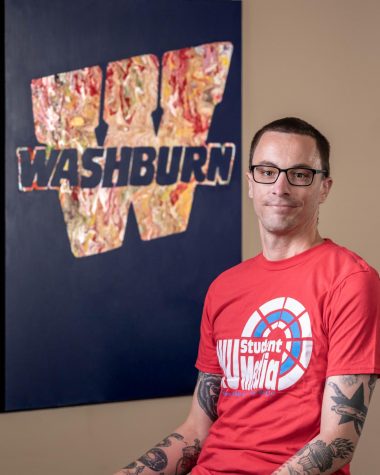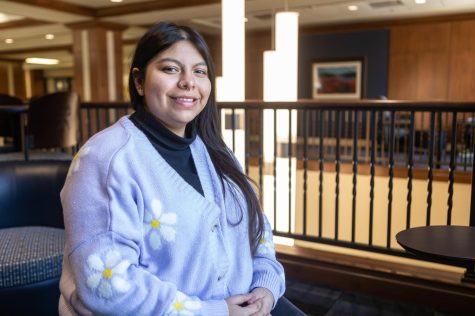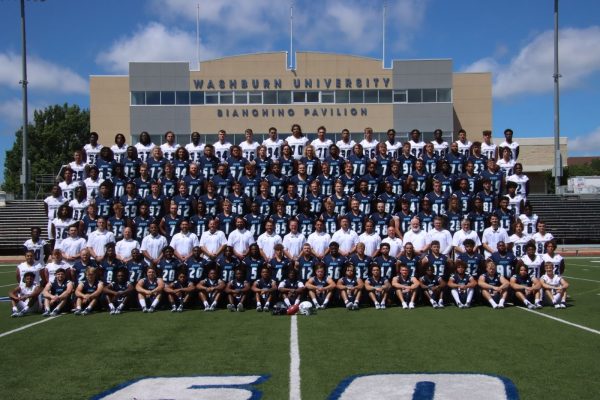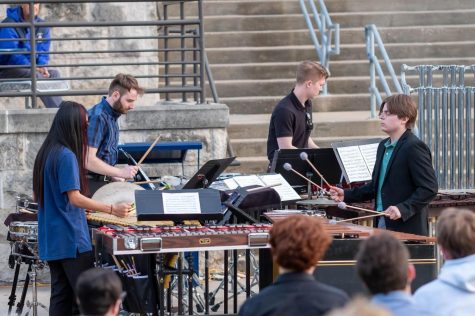Studying abroad: International students share their perspectives of the United States
Indigo Magazine
People generally have routines and expectations about ordinary things such as food, transportation, communication with others and the culture of work and school.
International students who come to study at Washburn face many new things all at once in a language that may not be familiar to them.
Take eating, for example. Many international students notice that the stereotypical American diet is carb-heavy and full of sugar.
“America has a lot of hamburgers and pizza,” said Larissa Zermiani Hoffmann Bassanesi, junior biochemistry major from Brazil. “In Brazil, we like actual food like rice, meat and vegetables. I live near the coast, so we eat a lot of seafood and fruits.”
Convenience is another way to evaluate the American diet.
“For me, the American meal is kind of simple and too heavy for me,” said Junnosuke Saito, sophomore communication studies major from Japan. “In Japan, we have many dishes for eating with rice, and the meal is more naturally flavored.”
Zermiani Hoffmann Bassanesi also mentioned the absence of natural flavor.
“In Brazil we use actual seasoning, so it tastes like that seasoning,” Zermiani Hoffmann Bassanesi said. “I feel like here, if you’re going to use some spices, you’re just going to use pepper. Not garlic or onions.”
It’s possible to make meals that remind students of home, but it is likely some adjustments are required.
“Sometimes I make a kind of Japanese meal for my American friends because they love learning about Japan,” Saito said.
However, adjustments must be made because Saito rarely ever sees the authentic brands he would buy where he’s from in Japan.
Like food, language can further compound the complexities of living abroad. Translating a textbook may be a challenge of its own for some, but it can be more difficult to navigate linguistic contexts with strangers. Many people can have their own ways of using their native languages or slang, which may not be taught in all language textbooks.
“In Brazil, we have a lot of specific words for specific things,” Zermiani Hoffmann Bassanesi said in reference to a beanie or stocking cap with a bobble. “Here, people use one word for a bunch of stuff. Like hats, with or without the bill— they’re all caps.”
If you’re a person who feels tongue-tied or stagefright in your native language, imagine speaking in a new one.
“The first year I couldn’t really speak English, but I was taking the public speaking class, so I had to speak,” Saito said. “My mind blew up, like everything. I forgot everything and just froze in the air.”
Approximately 170 international students from 34 countries attend Washburn University, and many of these students have never been to the U.S. before.
Andy Vogel is the recruitment and retention coordinator for International Programs at Washburn University. He has personally toured China and works with international students at Washburn.
“It’s very difficult to go to a university, just as is,” Vogel said. “But for it to be so different, to put yourself out there in a completely different country, has so many challenges.”
Vogel said many international students are degree-seeking and therefore spend four or five years here. Some don’t see their family and friends this entire time.
“International students really need a lot of support,” Vogel said. “That’s what the International House is here for, and I think we do a pretty good job at it.”
Vogel said it’s easy for people to underestimate the challenges— both universal and unique— for international students. Culturally speaking, students encounter many differences.
Saito said that one of the biggest differences between his home country and America is the amount of drivers on the road.
“In America, it feels as though everyone drives,” Saito said. “In Japan, you have to be 18 years old to drive. It also costs $3,000 USD just to get your license. That’s why we mostly use public transportation and motorcycles.”
Education as a whole also differs from country to country. Anastasiia Lurkova, a junior majoring in English linguistics from Russia, says that the education system here in America is easier than in her home country.
“Studying in Russia is so much harder. We would have at least 14 classes a semester in university, and you can’t change your major. If you want to, you have to pass around 30 to 40 exams for the major you wish to change to,” Lurkova said. “Although around 80% of young people in Russia have upper level education, the system hasn’t been updated since the Soviet Union, so much of it is outdated.”
Students from different cultures often find themselves in completely new situations.
“I think culture shock kind of denotes this idea that when you sound shocked, it’s not a good thing,” Vogel said. “I think in some instances, you can be shocked because you didn’t realize how awesome things are.”
For some, the absence of certain things that are popular in their home countries is also a breath of fresh air.
“I hate soccer,” Zermiani Hoffmann Bassanesi said. “Everyone in Brazil is crazy about soccer. It’s like soccer is their religion.”
Many appreciate discovering a different way of doing things than they knew back home.
“My boss here is super friendly,” Saito said. “In Japan, the boss wants you to be scared of them and you have to respect everything they do. Mainly, most Japanese people don’t want to interact with others. For example, we rarely open the door for others.”
Lurkova and Saito agree that the best way to get the most out of the experience is to get involved, keep an open mind and to branch out and go outside of your comfort zone.
“Washburn is very good to international students, so long as they let them know it’s okay to ask for help,” Saito said.
Your donation will support the student journalists of Washburn University. Your contribution will allow us to purchase equipment and cover our annual website hosting costs.















